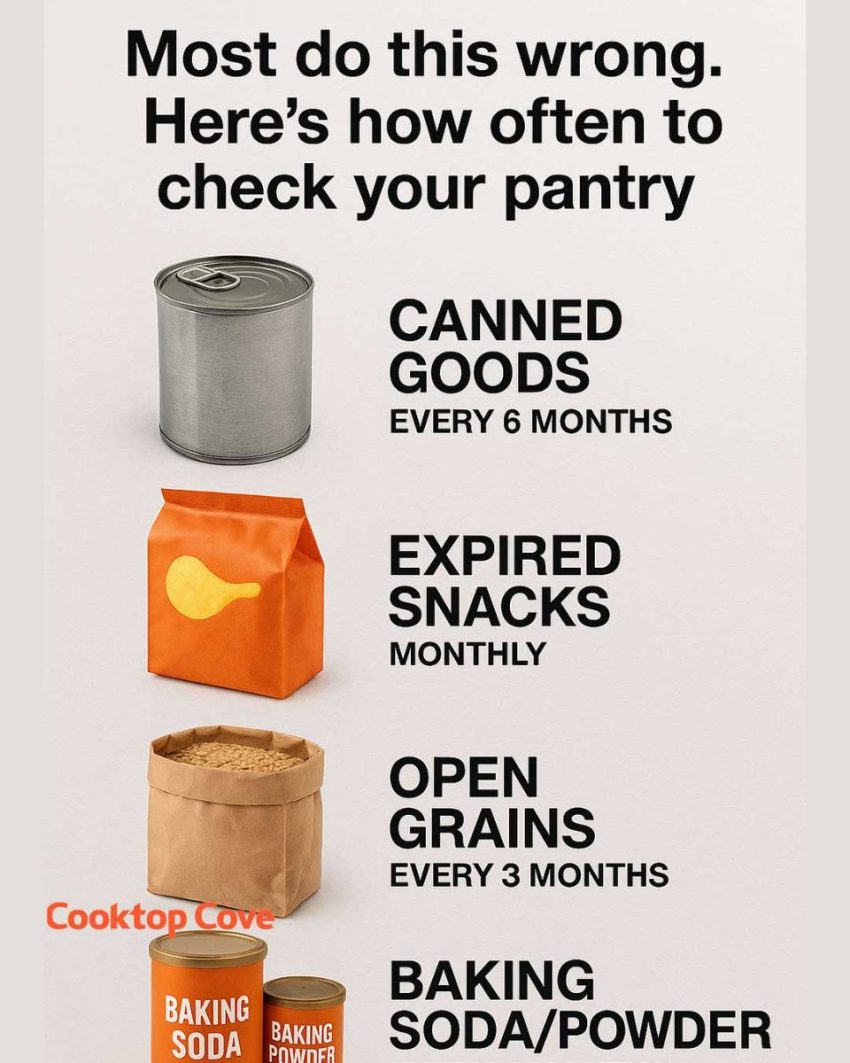ADVERTISEMENT
In the hustle and bustle of daily life, it’s easy to overlook the state of our pantry. Many of us are guilty of stocking up on groceries, only to forget about them until we need them. However, maintaining a well-organized and regularly checked pantry is crucial for both health and efficiency. Neglecting this can lead to wasted food, unexpected shortages, and even health risks from consuming expired products.
Understanding how often to check various items in your pantry can save you time, money, and hassle. This article will guide you through the optimal schedule for checking different pantry staples, ensuring that your kitchen remains a well-oiled machine. From canned goods to spices, each category has its own timeline, and adhering to these can make a significant difference in your culinary experience.
1. The Importance of Regular Pantry Checks
Regular pantry checks are essential for several reasons. Firstly, they help prevent food waste. According to the Food and Agriculture Organization, approximately one-third of food produced for human consumption is wasted globally. By routinely checking your pantry, you can use items before they expire and reduce your contribution to this statistic.
Moreover, regular checks ensure that you always have fresh ingredients on hand. This not only enhances the taste and nutritional value of your meals but also prevents the risk of foodborne illnesses. Expired or improperly stored food can harbor bacteria and toxins that are harmful to health. By maintaining a schedule for pantry checks, you can ensure that your ingredients are safe to consume.
2. Canned Goods: Every 6 Months
Canned goods are a pantry staple due to their long shelf life, but they are not immune to spoilage. It’s recommended to check your canned goods every 6 months. Look for any signs of rust, dents, or bulging, which can indicate compromised seals and potential contamination.
While canned goods can last for years, their quality diminishes over time. For best taste and nutritional value, try to use them within 1 to 2 years of purchase. Rotate your stock by placing newer cans at the back and older ones at the front, ensuring that older items are used first.
3. Expired Snacks: Monthly
Snacks, especially those that are opened, should be checked monthly. Items like chips, crackers, and cookies can go stale quickly once exposed to air. Even unopened snacks can lose their freshness over time, particularly if they contain oils that can become rancid.
To keep your snacks fresh, store them in airtight containers once opened. Regularly checking and consuming snacks before they expire will not only prevent waste but also ensure that you always have tasty treats on hand.
4. Open Grains: Every 3 Months
Grains such as rice, quinoa, and oats are pantry essentials, but once opened, they are susceptible to pests and moisture. Check open grains every 3 months to ensure they are still fresh and free from insects like weevils.
Store grains in airtight containers to prolong their shelf life and protect them from humidity. If you notice any off smells or signs of infestation, it’s best to discard the affected grains to prevent contamination of other pantry items.
5. Baking Soda and Baking Powder: Every 6 Months
Baking soda and baking powder are crucial for baking, but they lose their potency over time. Check these items every 6 months to ensure they are still effective. To test baking powder, mix a teaspoon with hot water; it should bubble immediately. For baking soda, mix a teaspoon with vinegar; it should fizz vigorously.
Store these leavening agents in a cool, dry place to maximize their shelf life. If they fail the freshness test, replace them to ensure your baked goods rise properly.
6. Spices and Herbs: Every 6 to 12 Months
Spices and herbs are best checked every 6 to 12 months. While they don’t spoil in the traditional sense, they do lose their flavor and aroma over time. Ground spices tend to lose potency faster than whole spices, so use them within 6 months for optimal flavor.
Store spices and herbs in airtight containers away from heat and light to preserve their quality. If a spice no longer has a strong aroma when you rub it between your fingers, it’s time to replace it.
7. Oils and Fats: Every 3 to 6 Months
Oils and fats, such as olive oil, vegetable oil, and butter, should be checked every 3 to 6 months. These products can go rancid, especially if exposed to heat and light. Rancid oils have an unpleasant smell and taste, which can ruin your dishes.
Store oils in a cool, dark place and keep them tightly sealed when not in use. If you notice any off odors or flavors, it’s best to discard the oil and replace it with a fresh bottle.
8. Condiments and Sauces: Every 3 to 6 Months
Condiments and sauces, including ketchup, mustard, and soy sauce, should be checked every 3 to 6 months. While many of these items have preservatives that extend their shelf life, they can still degrade in quality over time.
Once opened, store condiments in the refrigerator to prolong their freshness. Regularly check for changes in color, texture, or smell, which can indicate spoilage. Discard any condiments that show signs of deterioration.
9. Dried Pasta and Rice: Every 6 to 12 Months
Dried pasta and rice are long-lasting staples, but they should be checked every 6 to 12 months. While they rarely spoil, they can become infested with pantry pests if not stored properly.
Keep pasta and rice in airtight containers to protect them from moisture and pests. If you notice any signs of infestation, such as small bugs or webbing, discard the affected products immediately.
10. Nuts and Seeds: Every 3 Months
Nuts and seeds are nutrient-dense foods that should be checked every 3 months. Due to their high oil content, they are prone to becoming rancid, especially if stored in warm conditions.
Store nuts and seeds in airtight containers in the refrigerator or freezer to extend their shelf life. If they develop an off smell or taste, it’s best to discard them to avoid consuming rancid oils.
11. Flour and Baking Mixes: Every 6 Months
Flour and baking mixes should be checked every 6 months. These products can attract pantry pests and absorb odors from other foods, affecting their quality.
Store flour in airtight containers and consider refrigerating or freezing it to prevent infestation. If you notice any off smells or signs of pests, discard the affected flour and clean the storage area thoroughly.
12. Coffee and Tea: Every 6 to 12 Months
Coffee and tea should be checked every 6 to 12 months. While they don’t spoil, they can lose their flavor and aroma over time, especially if exposed to air and moisture.
Store coffee beans and tea leaves in airtight containers away from light and heat. If your coffee or tea no longer has a strong aroma or flavor, it’s time to replace it with a fresh batch.
ADVERTISEMENT


